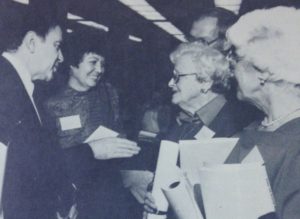Follow our weekly series, Throwback Thursday, designed to help celebrate 50 years of OHA. We’ll profile a year in the life of the organization each week with photos, logos, and highlights taken from the Oral History Association Newsletter. We welcome your memories, photos, and comments at oha@gsu.edu.
OHA in 1983…
Cal State-Long Beach President Stephen Horn, Sherna Gluck, and Rosie project participants Emilie Cook and Susan Laughlin
President: Elizabeth B. Mason, Columbia University
Site of the Annual Colloquium: Seattle, Washington
Newsletter: Tom Charlton, editor; L. Katherine Cook, Adelaide S. Darling, Rebecca S. Jiménez, Margaret L. S. Miller, associates
Editorial office: Baylor University, Waco, Texas
Annual individual membership: $15
Highlights of the year from the Oral History Association Newsletter
- A four-year oral history research project called Rosie the Riveter Revisited: Women and the World War II Experience wrapped in 1983. Sherna Gluck, coordinator of the Oral History Resource Center at California State University-Long Beach, launched the project after coming across a 1944 survey that found 80% of the women surveyed planned to continue working at their jobs after the war ended. “Hitler really did get us out of the kitchen” explained Tina Hill, a black interviewee with two years of college who could find work only as a domestic until the war began.
- OHA President Elizabeth B. Mason visited Seattle to make plans for the 1983 Annual Colloquium. She returned to New York by train, making whistle stops in oral history centers across the country during her transcontinental trip April 24-May 6, 1983.
- As a result of a constitutional amendment passed the previous year, OHA elected officers by mail ballot for the first time in 1983 rather than by vote at the Annual Colloquium. The change provided voting privileges to all eligible association members. For the first time, student members also received voting rights.
- An article entitled “History of OHA Humming Along” describes the OHA’s early efforts to record its own history. The article chronicles a series of interviews with leaders such as James Mink, Peter Olch, Knox Mellon, and Enid Douglass, people who had knowledge of the evolution of policies or activities of the association. The first interviews were deposited in the OHA archives at what was then North Texas State University in Denton, Texas, and more interviews were scheduled.
Who were we interviewing in 1983?
- Institute of Oral History, University of Texas-El Paso — union and non-union workers, management, and community leaders involved in three significant strikes in the twin cities of El Paso and Ciudad Juarez.
- Luke S. K. Kwong, sponsored by the Chinese University of Hong Kong — Chinese who lived through the fall of Hong Kong in 1941 and the Japanese occupation. More than 70 interviews provided details on survival techniques and the privations and cruelties the civilian population experienced.
- Institute for Black Religious Research at Garrett-Evangelical Theological Seminary — 115 interviews on black worship and devotional practices in the twentieth century conducted in metro Chicago and Mississippi, Alabama, Georgia, and South Carolina.

